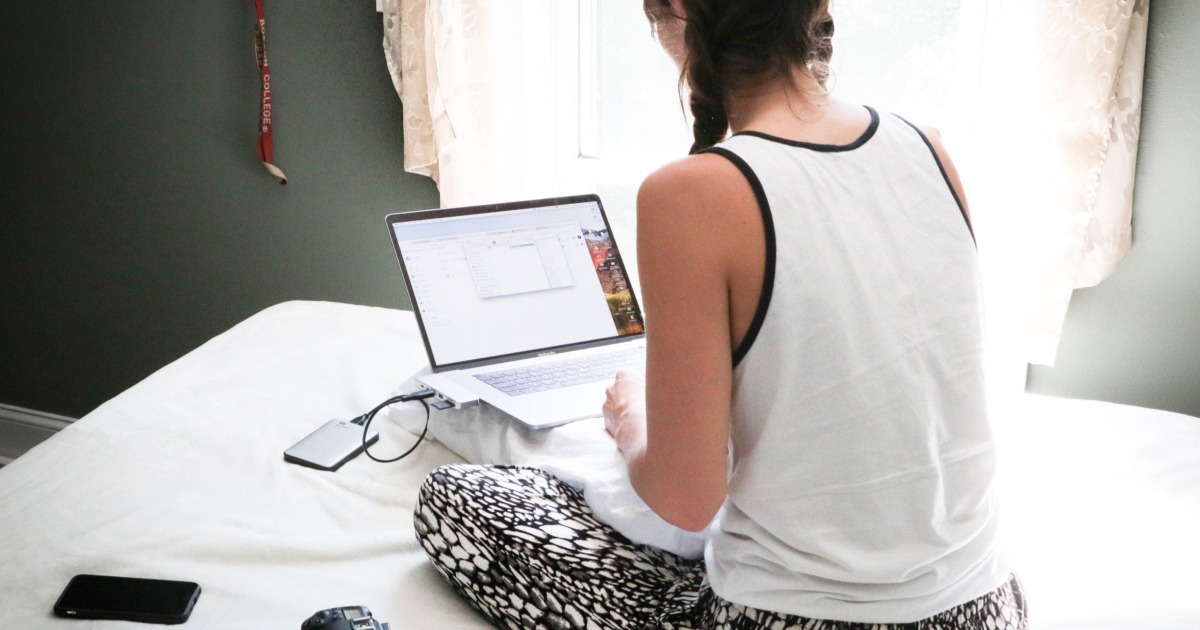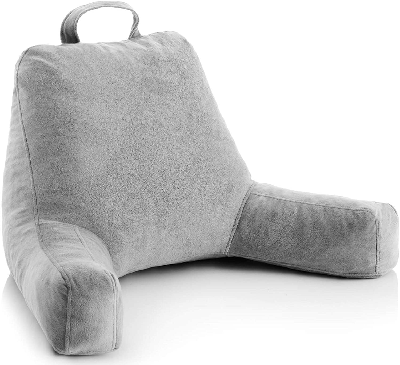How to Work from Your Bed
This post may contain affiliate links and Corporette® may earn commissions for purchases made through links in this post. As an Amazon Associate, I earn from qualifying purchases.

With so many people working remotely right now, we know that some of you may have fallen into work habits that aren't exactly ideal — so today we're talking about how to work from your bed. I am definitely guilty of this — I have a perfectly nice desk and a perfectly nice office chair in our home office, but I often go for months without using it, in favor of our bed. (That's where I'm writing this post.)
Yes, we acknowledge that working from your bed is not the best idea for many reasons:
(1) It can be harder to get in and/or stay in work mode.
(2) Unintentional naps are a possibility. (You may tell yourself you're just “resting your eyes” and then fall asleep for an hour.)
(3) It can be pretty bad for your posture.
(4) You won't appear too professional if you appear on Zoom with pillows in the background (although you can get around that by using a Zoom background).
(5) Maybe worst of all, working on your bed can affect your sleep — you may not feel as relaxed there when your brain has made the association of “bedroom = work.”
But hey, let's be realistic — nobody's perfect. So if you work from your bed — either sometimes or all the time — we've rounded up some tips to make it a little better. If you're a couch worker, some of this advice can help you too.
How to Work from Your Bed
Get up and move often
Sitting all day is harmful to your health, of course (although sit/stand desks, for example, aren't a magical solution), so take frequent movement breaks.
If you have a smartwatch, a Garmin, or other fitness wearable, set up reminders for this (just don't get annoyed and then ignore them like I do), or just use your phone. Here are some recommendations for apps that remind you to take active breaks.
While you're up, try these posture-improving exercises, these stretches, or these yoga poses — they're good for counteracting the effects of long-term sitting.
At some point during the day, maybe take a walk around the block, or go to the gym (if that's safe to do right now where you live).
{related: the best streaming workouts to do at home}
Buy a supportive pillow
Regular pillows don't offer much structure — even my “extra firm” ones — and this can lead to slouching, which may give you a sore back and/or neck.
Instead, try one of these gaming pillows (this one looks interesting, for example, although pricey) or this reading pillow that was recommended by Bustle.
I'd never thought of getting a specific pillow for working but am now intrigued. (These remind me of those “boyfriend pillows” people had in college, although better! Are they still a thing?)
Make sure to have good lighting
Keep yourself alert by avoiding working in a dimly lit room. Open your blinds or curtains and assess the lights already in your bedroom. Here are some tips from The Spruce on creating better home office lighting, including using a desk lamp and avoiding positioning yourself directly under harsh overhead lights.
Last year, I recommended this flexible reading light. My son uses it for reading in bed, and I think it would be also good for working in bed when you want light close by. It has nine brightness/color combinations, so it's easy to find one you like. (Note that it charges via USB cable.)
Around the same time, Kat wrote this Coffee Break about this lamp that can go on a nightstand — and she suggested this LED lamp in the same post.
{related: what are your favorite stores for lighting fixtures?}
Use a lap desk or tray for your laptop
When I work on my bed, I often use a lap desk. The one I've had forever is similar to this one — with a cushion on the bottom and a plain top — although funnily enough, I have never used the underside for a pillow like the dude in one of the product photos.
You can also find fancier ones with adjustable height and angle, phone holders and mousepads, and more. (I like the mousepad idea because I have a feeling using a touchpad all the time isn't great for your hand and wrist. I do it anyway.)
When you're working on an iPad or other tablet, a cushion like this one can be pretty handy. (And your iPad will be nice and comfy, too.) That one even has a pocket for your phone. If you're using a tablet with a Bluetooth keyboard, this stand has room for both.
{related: how to set up a great home office}
Keep things neat and clean
Make your bed every day, remove random clothes and other things, put away tempting items (the book you're currently reading, etc.), and keep any work papers neatly inside folders or on a table next to you. You'll feel a little more “professional” and more in work mode.
If you're going to have a snack or eat lunch, get up and go to the kitchen rather than eating in bed.
(An exception to keeping things off your bed: a decoy scratcher laptop to distract your cat from wanting to sit on yours!)
Readers, do tell: What are your tips on how to work from your bed? Does it work well for you, or have you found it harmful to your productivity, energy, or body?
Stock photo (young woman using her laptop while seated on her bed) via Stencil.


I really appreciate this post. It recognizes that not everyone lives in a suburban McMansion with an office. Lots of WFH tips are wildly tone deaf in that regard
I did this for five months and gave myself sciatica. Please reconsider sitting on your bed for long periods of time. Even standing with your laptop on a dresser is better for your spine.
Work from your bed pro of many years, here. Have also done interviews from bed. For enthusiasts who have their own offices, I strongly recommend a twin size bed futon chair. Not only great for naps, the futon chair is clutch for all nighters. Have a pandemic job with hours from 5 AM until late night, but has stretches of waiting? Futon chair. For around $200 on Wayfair, you, your pets, your children, your partner can all enjoy the futon chair. Note that when not rolled out like a bed, futon chair serves as a great chair. Use storage tupper as your desk command area no matter futon chair’s bed or chair mode. Am grateful to have had a secure high paying job during the pandemic. Futon chair has made it easier to work from home for more than a year.